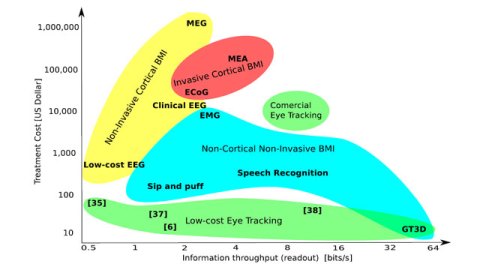The future of a home computer controlled by your eyes may be far closer than you think

There has been much focus over recent years, on brain machine interfaces (BMI) allowing for the direct control of a computer by electrodes placed on or near the brain. Unfortunately a clinically useful, cost effective solution doesn’t seem to be on the horizon as far as BMI’s are concerned and those that are (on the consumer markets) may actually work largely because of “artifacts” – the result of facial muscle movements rather than brain activity.
The situation with regard to eye tracking is a different story; researchers at Imperial College led by Dr. Aldo Faisal have developed a system by repurposing cameras designed for video game consoles, that is “1/800th” of the cost of some comparable commercial eye tracking systems. According to Faisal, speaking in a lecture on Saturday at Imperial Science Festival:
“Our device costs less than 10 pounds to manufacture and takes less than 5 minutes to learn to use”
I gave the eye tracker a go myself and was pretty impressed – when playing a game of pong the cursor seemed to move fluidly when following my eye movements. I was even able to win a game against an opponent using a hand operated controller. Admittedly, pong is a fairly straight forward game with binary controls, so I can’t speak for the value of the device with regard to more broader applications. According to Faisal, the group have somewhat perfected the ability to use a wink command to allow a user to click. We’ll have to wait and see how things pan out, but it now seems likely that eye trackers might become a household item far faster than anyone ever anticipated.
Regardless of whether we see these devices move into the home, there is little doubt that they or their descendants will prove valuable tools for the disabled. If the current costs of alternative more complex systems are anything to go by then for now at least, it certainly seems that the future of advanced human computer interaction may lie with eye tracking.
Reference
Abbott, W.W. and Faisal, A.A. (2012) “Using ultra-low cost 3D gaze tracking as an intuitive, non-invasive, high information throughput alternative to BMIs”. Bernstein Conference 2012 Munich (Germany), F 103, p. 228 [PDF]
Thanks to Imperial College London for putting on the fabulous and completely free Imperial Science Festival last weekend! I’ll be putting up another post shortly on Mirjam Tuk’s research on the rather counter-intuitive effects that needing to urinate has on decision making.





